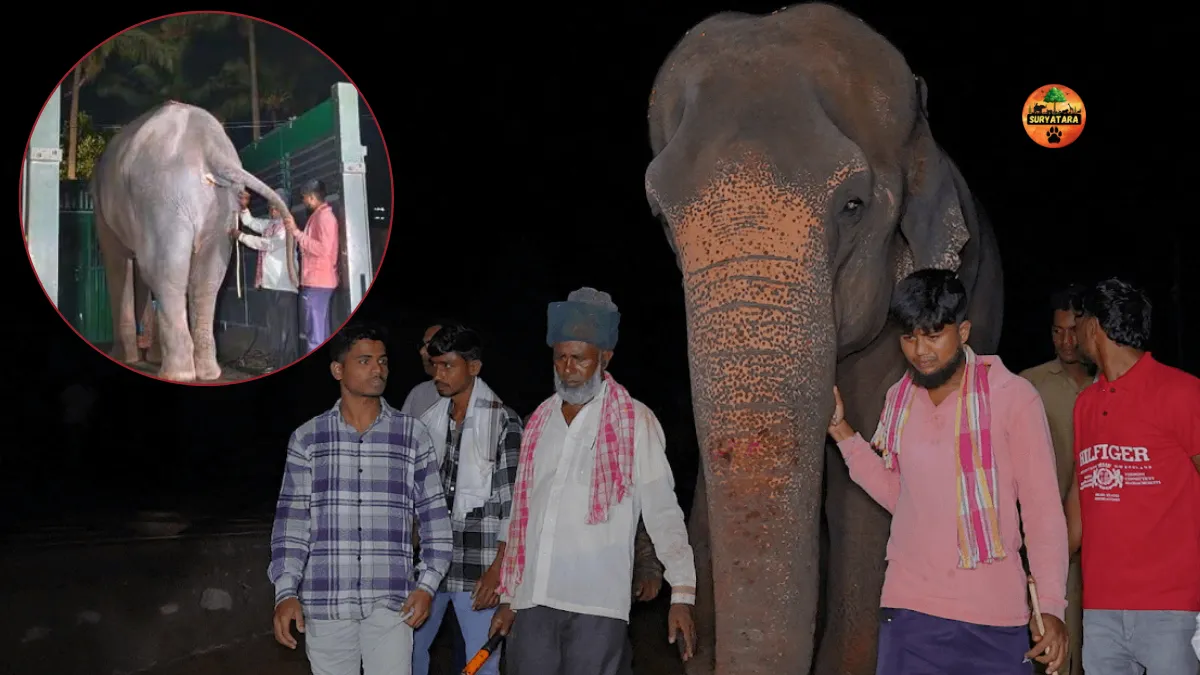Vanatara Animal Rescue Centre: In a major step for animal welfare in India, the Supreme Court has upheld the Bombay High Court’s decision to relocate an emotionally disturbed elephant named Mahadevi (also known as Madhuri) to a sanctuary. The elephant, who had been kept in chains for over three decades, will now be moved to a safe and healing environment, thanks to the intervention of PETA India and the continuous efforts of animal rights organizations.
Supreme Court Supports High Court’s Decision
The Supreme Court bench, led by Justices J.B. Pardiwala and R. Mahadevan, ruled in favor of rehabilitating Mahadevi, who had been living at the Swastishri Jinsen Bhattarak Pattacharya Mahaswami Sansthan Math in Nandani village, Kolhapur, Maharashtra. The elephant had been kept in isolation since 1992 and was involved in a tragic incident in 2017 where she fatally injured the head priest by slamming him against a wall.
This final verdict comes after the Jain Math appealed against the earlier order passed by the Bombay High Court on July 16, 2025, which directed Mahadevi’s relocation to a sanctuary due to her serious physical and mental health issues.
PETA India Raises Alarm
The decision to move Mahadevi was based on strong evidence and concerns submitted by PETA India to both the Maharashtra Forest Department and the High-Powered Committee (HPC) appointed by the Supreme Court. These concerns focused on the elephant’s poor living conditions, emotional suffering, and deteriorating physical health, including arthritis and painful foot rot caused by years spent on hard concrete surfaces.
PETA India welcomed the Supreme Court’s decision, highlighting that elephants are intelligent and emotional beings who need companionship and freedom from chains to live fulfilling lives. Khushboo Gupta, Director of Advocacy Projects at PETA India, expressed her gratitude, saying,
“We are thankful to the Supreme Court for recognizing Mahadevi’s right to live the rest of her life free from pain, fear, weapons, and isolation.”
Vantara-Style Sanctuary in Jamnagar for Mahadevi
According to the court’s directive, Mahadevi will now be shifted to the Radhe Krishna Temple Elephant Welfare Trust located in Jamnagar, Gujarat. This sanctuary offers a peaceful and safe environment for rescued elephants and is known for providing world-class care. Although not officially named under the Vantara initiative, the sanctuary follows the same principles of elephant rehabilitation, similar to Vanatara Animal Rescue Centre in Jamnagar, which has set a benchmark in wildlife rescue and ethical treatment of elephants.
At this new sanctuary, Mahadevi will be free from chains and weapons. She will be surrounded by other elephants, which will help improve her mental health. Moreover, she will receive specialized veterinary care, including hydrotherapy, to ease her arthritis and other medical issues.
Court Puts Welfare First
In its July order, the Bombay High Court had clearly stated that while the Jain Math may not have intended harm, the rights of the elephant must take priority over the temple’s religious practices. The judges observed,
“We have no doubt that the Petitioner-Math may have had no deliberate intent to cause injury to the elephant, however… priority must be given to the elephant’s welfare.”
The Supreme Court echoed this view by rejecting the appeal made by the Math, which wanted to keep Mahadevi despite her severe health conditions. The court emphasized that her transfer should be done with maximum comfort, considering her age and condition.
Also read: What is this Vantara: India’s Groundbreaking Wildlife Rescue Initiative
A History of Pain and Loneliness
Mahadevi’s story is heartbreaking. Taken from her natural habitat when she was only three years old, she was kept confined to a small shed in the Math, where she stood on a concrete floor for over 30 years. Her physical health slowly declined, and her emotional state worsened due to isolation and lack of natural surroundings.
Interestingly, at one point, the Bhattarak Math had expressed willingness to rehabilitate Mahadevi. However, over time, their position changed, and they began renting her out for events like Muharram, ignoring her declining condition. This shift in treatment led to legal action and growing public support for her rescue.
Also read: What is Vantara Gajsevak Sammelan? Anant Ambani’s Grand Step Towards Elephant Welfare
A Humane Future: Mechanical Elephants Proposed
To promote humane practices, both PETA India and the Federation of Indian Animal Protection Organizations (FIAPO) have offered to donate mechanical elephants to the Jain Math. These lifelike machines can be used in temple rituals without causing harm to real animals.
The organizations have encouraged other temples across India to follow this compassionate model, replacing live elephants with mechanical ones. This approach benefits not only the elephants but also human safety and spiritual ethics.
Conclusion: Vanatara Animal Rescue Centre
The story of Mahadevi is a reminder of the suffering that animals endure in silence, often in the name of tradition. Thanks to timely legal intervention and continuous advocacy by organizations like PETA India, she now has a chance to live out the rest of her life in peace.
As sanctuaries like Vantara in Jamnagar continue to set new standards for wildlife rescue and rehabilitation, India takes a step closer to becoming a nation that values compassion alongside culture. Mahadevi’s journey—from chains and isolation to freedom and healing—marks a victory for animal rights and a brighter path forward for all temple elephants in India.













